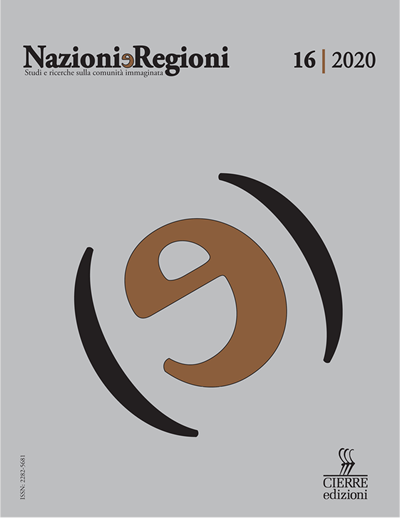Distruggere le parole, violare i corpi, eliminare i luoghi: memorie contese nella ex-Jugoslavia<br><br>Destroyng words, violating bodies, eliminating places: contested memories in former Yugoslavia
DOI:
https://doi.org/10.15162/2282-5681/1355Parole chiave:
confine, violenza, donne, guerra, nazione, memoria, ex Jugoslavia, border, violence, women, war, nation, memory, former YugoslaviaAbstract
A venticinque anni di distanza dall’epurazione etnica avvenuta nei territori della ex-Jugoslavia possiamo registrare come oggi quella guerra sia ancora pienamente in atto: finiti i massacri senza distinzione tra civili e militari, dopo gli stupri di migliaia di donne e bambine musulmane e non musulmane, le armi non sono più le stesse. Le armi della guerra oggi sono quelle altrettanto distruttive e micidiali del silenzio, della vergogna, del disagio, del dolore delle donne e degli uomini sopravvissuti al genocidio del loro popolo. Conclusa l’azione Tribunale Penale Internazionale per l’Ex-Jugoslavia con la condanna di molti dei capi militari del genocidio, in tema di giustizia riparativa, l’istituzione nel 2015 del Tribunale delle Donne dei Balcani, proprio a Sarajevo, appare poco più di un atto simbolico, in uno scenario dai contorni ancora estremamente nebulosi e perciò pericolosi, e in cui la parola giustizia non sarà forse mai pienamente pronunciata. E tuttavia si tratta di un passo decisivo per costruire – almeno – un racconto comune della guerra, il segno che qualcosa – forse – sta cominciando realmente a cambiare, non solo nei discorsi istituzionali, ma nella mentalità delle singole persone. Ciò che si intravede finalmente è la volontà seria di superare il confine, fino ad oggi invalicabile, di una storia profondamente divisa, scritta – o meglio sovrascritta – dopo aver cercato di cancellare del tutto le memorie precedenti, dopo aver pervicacemente cercato di negare il genocidio. La ricerca rende conto di questo difficile e lunghissimo percorso di presa di coscienza collettiva, dando voce principalmente alle donne, che furono allora e sono ancora oggi dolorosamente protagoniste di quella che fu non solo l’implosione deflagrante della nazione costruita Tito nel 1945, ma – come sostiene la filosofa Rada Iveković- una vera e propria guerra europea.
Twenty-five years after the ethnic cleansing that took place on the territory of former Yugoslavia, we can realise that, even if by now the massacres that did not distinguish between combatants and civilians and the rape of thousands of Muslim and non-Muslim women and girls are over, that war is still going on, although with different weapons. The weapons employed in the current war are no less destructive and mortal than the previous ones: they are the silence, shame, unease and pain of the women and men who survived their people’s genocide. Concerning restorative justice, after the International Criminal Tribunal for Former Yugoslavia concluded its activity by passing judgments on the military leadership responsible for the genocide, the establishment of the Court of Women for the Balkans in Sarajevo in 2015 seems to be little more than a symbolic gesture, in the background of a situation that is still extremely unclear and thus dangerous, in which justice may never really materialize. Yet, this is a decisive step to build at least a shared narrative of the war, a sign that maybe something is really beginning to change not only in institutional discourse, but also in each and every person’s mentality. What can be seen at last is a serious willingness to cross the border, until now uncrossable, of a deeply divided history; a history written – or more precisely overwritten – on previous memories that some have attempted to erase by wilfully trying to deny the genocide. This research accounts for this difficult and extremely long path towards collective awareness by giving voice mostly to women, who were then and are still today painfully at the centre of what was not just the resounding implosion of the nation built up by Tito in 1945, but also – as maintained by the philosopher Rada Iveković – a truly European war.
Riferimenti bibliografici
Amnesty International (2009), ‘Whose Justice?’ The Women of Bosnia and Herzegovina Are Still Waiting, <http://tbinternet.ohchr.org/Treaties/CCPR/Shared%20Documents/BIH/INT_CCPR_NGO_BIH_104_8149_E.pdf>.
Amnesty International (2009), Interviews with Survivors of Rape, Various Locations, March, .
Boiano I. (2015), Femminismo e giustizia penale, Ediesse, Roma.
Brownmiller S. (1976), Contro la nostra volontà. Uomini, donne e violenza sessuale, trad. it. di A. D’Anna, Bompiani, Milano.
Buss D. (2009), «Rethinking “Rape as a Weapon of War”», Feminist Legal Studies, 17, pp. 145-163.
Buss D. (2013), «Knowing Women: Translating Patriarchy in International Criminal Law», Social & Legal Studies, n. 2.
de Brouwer A.-M. (2005), Supranational Criminal Prosecution of Sexual Violence: The ICC and the Practice of the ICTY and the ICTR, Intersentia, Antwerpen.
Cox M. (1995), The US Foreign Policy after the Cold War. Superpower Without Mission?, London, Pinter.
Del Ponte C. (2009), La Caccia, Feltrinelli, Milano.
Di Palma S.V. (2014), «Corpi di donne in guerra. La violenza sessuale in Bosnia e Ruanda e i problemi del dopoguerra», Storicamente, 10 (2).
Doni E. – Valentini C. (1993), L’arma dello stupro. Voci di donne della Bosnia, La Luna Editore, Roma.
Elshtain J.B. (2009), «Woman, the State, and War», International Relations, 23 (2), pp. 289-303.
Fejić G. – Iveković R. (2015), «Women and Armed Conflicts», Cosmopolis, 3-4, pp. 168-184.
Flores M. (a cura di) (2010), Stupri di guerra. La violenza di massa contro le donne nel Novecento, FrancoAngeli, Milano.
Gagliani D. (2007), Stupri di guerra. Un’analisi dei silenzi, dei racconti, delle denunce, AMS Acta, Unibo.
Greenberg M.E. – Zuckerman E., The Gender Dimensions of Post-Conflict Reconstruction: The Challenges in Development Aid, United Nation University, Research Paper No. 2006/62, June 2006, <https://2001-2009.state.gov/documents/organization/98033.pdf>.
Gutman R. (1993), A Witness to Genocide, Macmillan, New York.
Hayden R.M. (2012), From Yugoslavia to the Western Balkans: Studies of a European Disunion, 1991-2011, Brill, Leiden.
Hroch M. (1992), «Linguistic Conflicts in Eastern Europe and Their Historical Parallels», in Rupesinghe K. – King P. – Vorkunova O. (a cura di), Ethnicity and Conflict in a Post-Communist World, Palgrave Macmillan, London.
Human Rights Watch (2000), Kosovo: Rape as a Weapon of Ethnic Cleansing, Report, 1-III, .
Human Rights Watch (2001), World Report, Bosnia and Hercegovina, .
Human Rights Watch (2001a), Bosnia: Landmark Verdicts for Rape, Torture, and Sexual Enslavement, 22-II, .
Iveković R. (1995), La balcanizzazione della ragione, Manifestolibri, Roma.
Iveković R. (1999), Autopsia dei Balcani, Raffaello Cortina Editore, Milano.
Iveković R. (2000), Ethnic and regional conflicts in Yugoslavia and Transcaucasia: A political economy of contemporary ethnonational mobilization (Europe and the Balkans international network), Longo Editore, Ravenna.
Iveković R, (2015). «Nasilje i iscijeljenje: ratno i poratno razdoblje od prve generacije i poslije nje», in S. Zajović (ed.), Ženski sud: o procesu organizovanja», Žene u crnom, Beograd, pp. 94-123, .
Iveković R. – Mostov J. (eds.) (2001), «From Gender To Nation», Europe and the Balkans International Network, n. 16.
Jergović M. (2004), Sarajevo Marlboro, Archipelago Books, New York, [1994].
Kaplan C. – Alarcón N. – Moallem M. (1999), Between Woman and Nation: Nationalisms, Transnational Feminisms, and the State, Duke University Press, Durham, .
Kumalo K., «Why Women Should Have a Greater Role in Peacebuilding», in World Economic Forum, 26-V-2015, .
Mazzucchelli F. (2017), «Semiotiche dei confini e narrative spaziali della memoria in Bosnia Erzegovina: monumenti, musei, città», Storicamente, 13 (5).
MacKinnon C.A. (1993), «Crimes of War, Crimes of Peace», UCLA Women’s Law Journal, 4 (1), pp. 59-87.
Menon R. – Bhasin K., Borders & Boundaries: Women in India’s Partition, Rutgers University Press, New York, 1998.
Moghadam V. M. (1994), Gender and National Identity: Women and Politics in Muslim Societies, UNU/WIDER- Zed Books, London.
OSCE (2012), The Right to Social Protection in Bosnia and Herzegovina: Concerns on Adequacy and Equality, .
Pirjevec J. (2006), Le guerre jugoslave,1991-1999, Einaudi, Torino.
Pye L. W., «Political Participation: Crisis of the Political Process», in Leonard Binder (ed.), Crises and Sequences in Political Development, Princeton University Press, Princeton, 2015 [1971].
Ruzza N. (2014), Gli stupri etnici nelle guerre dell’ex Jugoslavia. Lo sguardo delle scrittrici migranti, DEP, 24, pp. 18-35.
Tabeau E. – Bijak J. (2005), «War Related Deaths in the 1992-1995 Armed Conflicts in Bosnia and Herzegovina: A Critique of Previous Estimates and Recent Results», European Journal of Population, 21 (2-3), pp. 187-215.
UN Security Council (1994), Letter from the Secretary-General to the President of the Security Council, 24-V, .
UNIFEM (2000), No Safe Place: An Assessment on Violence against Women in Kosovo, Report, 1-IV, .
Valji N. (2016), «Expert’s Take: Women’s Meaningful Participation still the Missing Ingredient in Peacebuilding», UN Women, 25-X, .
Vranić S. (1996), Breaking the Wall of Silence: The Voices of Raped Bosnia, Antibarbarus, Zagreb.
Women Under Siege Project (s.d.), Bosnia, .
Downloads
Pubblicato
Fascicolo
Sezione
Licenza
Nazioni e regioni è una rivista open access che applica la licenza Creative Commons CC BY-NC-ND 4.0 a tutti i contenuti pubblicati.
Nazioni e regioni is an open-access journal that applies the Creative Commons CC BY-NC-ND 4.0 licence to all published contents.







